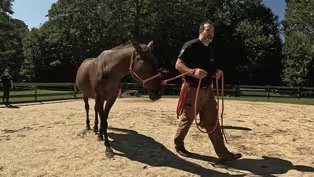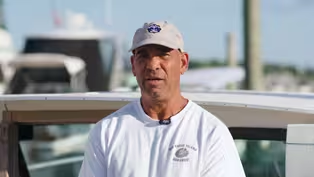
Never Forget
Clip: Season 4 Episode 45 | 11m 51sVideo has Closed Captions
Holocaust survivors in Rhode Island describe what happens when Jewish hate goes unchecked.
This week marks the 85th anniversary of Kristallnacht. While the Holocaust is the most extreme example of Jewish hate in history, it’s hardly the only one. Nationwide, there’s been a rise in antisemitic incidents in recent years. Rhode Island Holocaust survivors describe what happens when violence against Jewish people is left unchecked.
Problems playing video? | Closed Captioning Feedback
Problems playing video? | Closed Captioning Feedback
Rhode Island PBS Weekly is a local public television program presented by Ocean State Media

Never Forget
Clip: Season 4 Episode 45 | 11m 51sVideo has Closed Captions
This week marks the 85th anniversary of Kristallnacht. While the Holocaust is the most extreme example of Jewish hate in history, it’s hardly the only one. Nationwide, there’s been a rise in antisemitic incidents in recent years. Rhode Island Holocaust survivors describe what happens when violence against Jewish people is left unchecked.
Problems playing video? | Closed Captioning Feedback
How to Watch Rhode Island PBS Weekly
Rhode Island PBS Weekly is available to stream on pbs.org and the free PBS App, available on iPhone, Apple TV, Android TV, Android smartphones, Amazon Fire TV, Amazon Fire Tablet, Roku, Samsung Smart TV, and Vizio.
Providing Support for PBS.org
Learn Moreabout PBS online sponsorshiphe bedroom windows.
I saw him being dragged down the street and it was so utterly traumatic to see my father in that position.
- [Michelle] It was the night of November 9th, 1938.
Ruth Oppenheim recalls watching in fear as her father, the head of the community's Jewish congregation was dragged toward the town marketplace in Northwestern Germany.
- We prayed a lot, our main prayer and our pleaing to God to bring our father back alive.
- [Michelle] Decades later, Oppenheim, who now lives in Barrington, describes in detail what unfolded 85 years ago.
She was 10 years old, huddled in bed with her mom and siblings when they heard a noise coming from the back stairs.
It was her father returning home, hunched over, covered in blood and holding a Torah.
- He was the one who was beaten and was supposed to destroy the Torah.
Of course, he couldn't do that because the Torah to us was sacred and they kept on beating him.
- [Michelle] Eventually, Oppenheim and her family hid outside all night in the cold weather.
It was Kristallnacht, known as the night of broken glass.
- [Reporter] Kristallnacht was a mixture of method and madness.
Smashed shop windows, killings, the first deportations to camps.
- [Michelle] Members of the Nazi party and their supporters destroyed and vandalized synagogues, houses, and Jewish-owned businesses.
- We slowly went back into our house.
There was crystal all over the floor and furniture turned upside down.
- [Michelle] Oppenheim left Germany in 1940 and moved to the United States where she lived with her immediate family.
But life in Nazi Germany is far from a distant memory.
She's been saddened to see antisemitism did not end with the defeat of the Nazi regime.
The Anti-Defamation League reported the highest number of anti-Semitic incidents last year, nearly 3,700 nationwide.
- At least four people, including a rabbi, are being held hostage inside a north Texas synagogue.
- Now the search is on for two people involved in a Staten Island hate crime.
- This happened outside a kosher supermarket.
- [Michelle] And Rhode Island has also seen its share of anti-Semitic incidents.
- Providence police are investigating after an anti-Semitic note was found at the Brown RISD Hillel on Sunday.
- White Nationalist posters are circulating across local cities in Townsend, Rhode Island.
- It's all disheartening, but not surprising to Sarah Mack.
She's the senior rabbi at Temple Beth-El in Providence.
She says, growing up in Seattle, Washington, she never felt unsafe as a Jew.
Do you feel unsafe as a Jew in today's world?
- I feel safe here at Temple Beth-El because I know how we're cared for and the measures that we take.
I won't pretend that when I walk into a Jewish space that I'm unfamiliar with, I look around and and find the exits.
- [Michelle] We first spoke with Rabbi Mack in late August before the start of the Israel-Hamas war.
- As we speak, Palestinian gunmen are inside Israeli towns and cities, and they are fighting running gun battles against Israeli forces trying to regain control.
- [Michelle] Within a week of the start of the war, the temple was the target of two bomb threats.
We went back to talk with Rabbi Mack and find out how her congregation is doing.
- My congregation is just gutted and demoralized and heartbroken by the events in Israel.
There's so much to grieve.
Let us not forget that this is the greatest loss of Jewish life in a pogrom since the time of the Holocaust.
- [Michelle] Mack says the future of Israel complicates the grief so many of her congregants are experiencing.
- That just hurts so deeply to the core of the Jewish community.
And I'll say I don't know anybody in the Jewish community whose heart isn't grieved by the loss of life in Gaza either.
We hold both of those realities that, you know, civilian life and life of children.
I mean, it's heartbreaking across the board.
- [Michelle] The history of antisemitism dates back to ancient times.
It's been called the world's oldest hatred.
Alice Eichenbaum, a Holocaust survivor who raised a family in Rhode Island, was 13 when she says Jewish hate upended her life.
- In March of 1941, the German troops marched into Bulgaria and that's when like overnight everything changed.
- [Michelle] Eichenbaum remembers seeing the swastika flown on top of her German school in Bulgaria.
Her classmates became mean to her and stopped inviting her to birthday parties.
- All of a sudden, I hated to go to school.
Every morning I remember I was crying and I would say, "Do I have to go to school?"
And my mother would say, my parents would say, "Of course you have to go, you have to finish."
- [Michelle] Eichenbaum then went to a French-Catholic school that accepted Jewish students.
A few years later, Eichenbaum, her parents and grandmother were forced to live in a ghetto in Bulgaria near the Turkish border where Jews were segregated from the rest of the population.
Three families were crammed into one room.
- Life was, it was not fun.
You know, it's a crowded room, nothing to do all day.
We had curfew, only one hour a day freedom.
I had to go to the well to bring two buckets of water 'cause we had no running water so we had something to drink.
- Did you go hungry while you were living there?
- Oh yeah.
There were hungry times.
Yes, there wasn't, there was sometimes there was nothing to eat.
But let me tell you, when I was in the ghetto, I appreciated every, every drop, a little piece of bread.
- [Michelle] Eichenbaum and her family were liberated in 1944 by the Russian Army.
At the age of 95, she continued to make it her mission to ensure the Holocaust is never forgotten.
- It's something that doesn't happen overnight.
It's a slow process.
- [Michelle] She's shared her story with children and adults hundreds of times.
On this day, she spoke with students at the Sandra Bornstein Holocaust Education Center in Providence, which she and her late husband helped to establish.
- Slowly, slowly, Hitler built more concentration camp.
The swastika started to fly over.
Life started to change.
My father had lost the business.
- [Michelle] Eichenbaum's husband Raymond survived Auschwitz and was driven to speak up in the wake of Holocaust deniers.
- Just as it is said that every Jew is obligated to feel as if he personally has been brought out of slavery from Egypt.
- [Michelle] The two were featured in a 1985 documentary with other Holocaust survivors living in Rhode Island.
- Coming over here with a suitcase in your hand with no money in your pocket, with no language- - In your mouth.
- And you don't know nobody, nobody knows you.
- [Michelle] After her husband died, Eichenbaum decided it was her turn to tell both of their stories.
- And that's the last time, the last time he saw his sister.
And he never, never to the dying day, found out what happened to her.
- [Michelle] Talking about her husband's painful past and her own isn't easy, but Eichenbaum felt a great responsibility to keep doing it.
So does Ruth Oppenheim.
- Childhood trauma has deeply affected me.
My father's courage remains a guiding example.
- [Michelle] She gave the keynote address earlier this year at Brown University's Global Day of Inclusion.
- I count on you to remember long after I am gone, do not let it happen here.
- You've said that over the years, it's become increasingly harder to share your story.
And so I'm curious, why do you continue to share your story?
- Because I feel so strongly about what happened to my family and particularly the part of the family that we were so close to.
A little cousin who was doubly related and who was gassed to death.
And when I feel tired and maybe not up to things, then I think of him and it gives me the strength to go on.
- [Michelle] She says she loved her five-year-old cousin Helmut like a little brother.
His parents were also gassed to death.
- I seem to have a lot of tenacity as I examined myself.
- [Michelle] At 95, Oppenheim's family and faith continue to give her a strong will to live.
- We did not lose faith somehow.
And when people say, "How could God have allowed this?"
My answer was always, "What man does to man, you can't blame on God."
- [Michelle] For Alice Eichenbaum over the years, she says, she continually drew strength from younger generations, including her two sons and being able to attend her granddaughter's bat mitzvah.
- This was a touching moment for me because I felt another generation is, that Hitler didn't kill us all.
That the suffering of my husband and me were not in vain.
Video has Closed Captions
Clip: S4 Ep45 | 9m 3s | Visit a farm program for veterans suffering from PTSD that offers healing through horses. (9m 3s)
Video has Closed Captions
Clip: S4 Ep45 | 4m 37s | Everything you need to know about Quahogs, Rhode Island's favorite clam. (4m 37s)
Providing Support for PBS.org
Learn Moreabout PBS online sponsorship
- News and Public Affairs

Top journalists deliver compelling original analysis of the hour's headlines.

- News and Public Affairs

FRONTLINE is investigative journalism that questions, explains and changes our world.












Support for PBS provided by:
Rhode Island PBS Weekly is a local public television program presented by Ocean State Media

